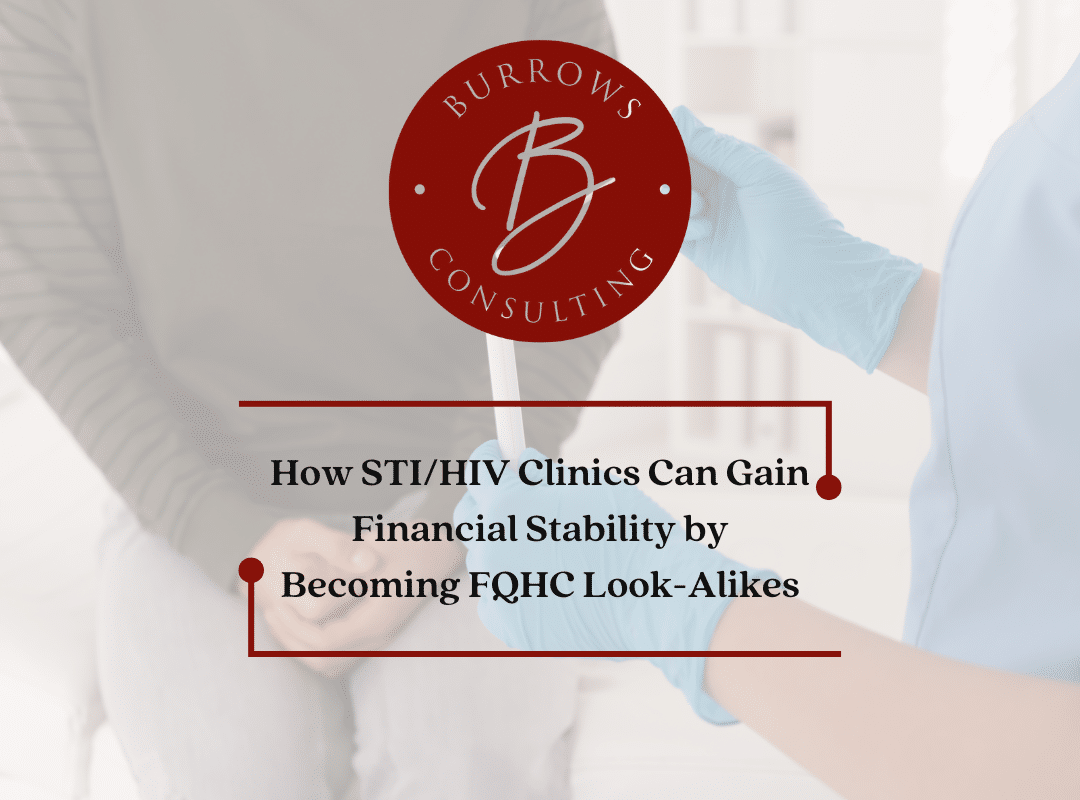Securing long-term financial stability for STI and HIV Clinics can be a constant challenge. Limited grant funding, growing patient needs, and rising operating costs can stretch your clinic thin. The good news is that there is a strategic path forward: becoming a Federally Qualified Health Center Look-Alike (FQHC Look-Alike).
At Burrows Consulting, we help STI and HIV Clinics across the country, including Ryan White providers, navigate the FQHC Look-Alike application process. This designation does not include Section 330 grant funding, but it provides many of the same benefits as full FQHC status. For many organizations, it offers the financial structure needed to grow and sustain care for the long term.
1. Enhanced Medicaid and Medicare Reimbursements
FQHC Look-Alikes receive cost-based reimbursement rates under Medicaid and Medicare. Instead of being paid standard fee-for-service rates, your clinic is reimbursed based on the actual cost of delivering care. This change results in more predictable income and reduces your reliance on limited or one-time funding sources.
2. Access to the 340B Drug Pricing Program
FQHC Look-Alikes are eligible for the 340B Drug Pricing Program. If your clinic dispenses HIV antivirals, PrEP, or STI treatments, this program allows you to purchase medications at significantly reduced prices. These savings can then be reinvested in your clinic’s operations, expanded services, or additional staff support.
3. Federal Malpractice Coverage Eligibility
Becoming a Look-Alike makes your clinic eligible for Federal Tort Claims Act (FTCA) malpractice coverage. This means your clinic may no longer need to carry costly private malpractice insurance. For many STI and HIV Clinics, this alone results in substantial annual savings that can be redirected to direct patient care or outreach.
4. Increased Access to Additional Grants and Programs
Once designated as a Look-Alike, your clinic becomes eligible for various federal programs, including provider loan repayment incentives and priority access to other funding opportunities. In addition, FQHC Look-Alikes are often viewed as more stable, mission-aligned providers by private foundations and state health departments, improving your chances of securing external support.
Bottom Line: Becoming a Federally Qualified Health Center Look-Alike is a strategic, cost-effective option for STI and HIV Clinics seeking long-term financial stability. It opens the door to enhanced reimbursements, 340B savings, FTCA coverage, and stronger positioning for future funding. If your clinic is ready to build a more sustainable financial foundation while continuing to serve your community, Burrows Consulting is here to help. Our team specializes in Look-Alike applications, healthcare grant writing, and FQHC compliance.
Works Cited
- Health Resources and Services Administration. “Health Center Program: Impact and Growth.” U.S. Department of Health and Human Services, 2024. https://bphc.hrsa.gov.
- Kaiser Family Foundation. “Community Health Centers: Recent Growth and the Role of the ACA.” 2023. https://www.kff.org.
- Rural Health Information Hub. “Federally Qualified Health Centers (FQHCs).” Accessed 2024. https://www.ruralhealthinfo.org.
- Centers for Disease Control and Prevention (CDC). “Integrating HIV Prevention and Treatment Services.” Accessed 2024. https://www.cdc.gov.
- National Association of Community Health Centers. “The 340B Drug Pricing Program: A Critical Program for Health Centers.” 2023. https://www.nachc.org.

0 comments to " How STI/HIV Clinics Can Gain Financial Stability by Becoming FQHCs "